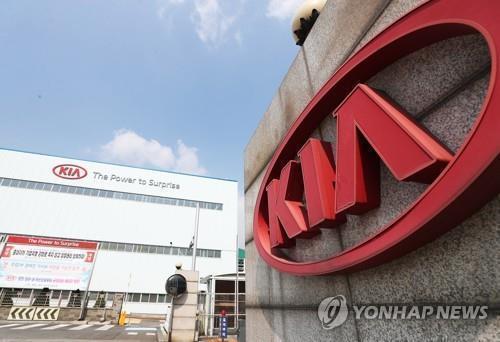- California Assembly OKs highest minimum wage in nation
- S. Korea unveils first graphic cigarette warnings
- US joins with South Korea, Japan in bid to deter North Korea
- LPGA golfer Chun In-gee finally back in action
- S. Korea won’t be top seed in final World Cup qualification round
- US men’s soccer misses 2nd straight Olympics
- US back on track in qualifying with 4-0 win over Guatemala
- High-intensity workout injuries spawn cottage industry
- CDC expands range of Zika mosquitoes into parts of Northeast
- Who knew? ‘The Walking Dead’ is helping families connect
Kia union approves tentative 2022 wage deal amid chip shortage
Unionized workers at Kia Corp. have tentatively agreed to a wage deal for 2022 amid the extended chip shortage and COVID-19 pandemic, the company said Friday.
Kia’s 30,000-strong union tentatively accepted the company’s proposals, including a 98,000 won (US$68) increase in basic monthly pay, three months of performance-based pay, 5.5 million won in cash, 250,000 won in a gift certificate per person and 49 Kia stocks, the company said in a statement.
The company also agreed to make “joint efforts” with the union in transforming its domestic plants into a core production facility for future vehicles, such as purpose-built vehicles.
The tentative deal will be put up for a vote next week, the statement said.
Kia has eight plants in Korea — two in Gwangmyeong, three in Hwaseong and three in Gwangju — and seven overseas ones — three in China and one each in the United States, Slovakia, Mexico and India. Their overall annual capacity is 3.84 million units.
From January to September, Kia’s vehicle sales rose 2 percent to 2,171,274 units from 2,128,410 during the same period of last year.
Kia aims to sell 3.15 million vehicles globally this year.

This file photo, taken April 27, 2020, shows Kia Motors’ Sohari plant in Gwangmyeong, south of Seoul. (Yonhap)








![일본 사도광산 [서경덕 교수 제공. 재판매 및 DB 금지]](http://www.koreatimesus.com/wp-content/uploads/2024/07/PYH2024072610800050400_P4-copy-120x134.jpg)


